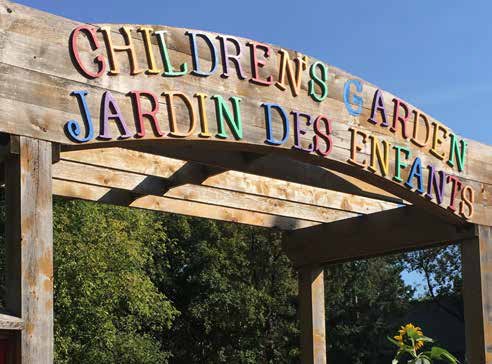
The Children’s Garden host the Queer and Trans Youth Garden Club every Sunday morning.
Photo by Geneviève Gazaille
Lorne Abugov
Strolling by the Ottawa Children’s Garden in the early autumn, one is taken aback by the sheer bounty of green produce awaiting harvest that has sprung up this past growing season from the well-tended beds of soil.
Less visible, however, than the bumper crop of fruits and vegetables is something else that has taken root within the peaceful precincts of the garden for a small but vulnerable group of inner-city pre-teen and teen gardeners – a growing sense of security and self-assuredness that comes from the simple pleasure of learning to garden in a safe space within the heart of the city.
Now in its second year of existence, the Queer and Trans Youth Gardening Club offers a safe space every Sunday from 10 am to noon at the Children’s Garden for inner-city LGBTQ youth between the ages of nine and 19.
“We are dealing with such a sensitive group of youth every week,” says Bia Salles, who together with her wife Kristen Gilchrist-Salles, serve as the facilitators for the Club, which they founded two years ago to allow young people in crisis over their gender and sexuality a sanctuary where they could learn and experience the joys of gardening in safety. “What is so important for these youth, in particular, is the knowledge that they can come to the garden, spend thoroughly enjoyable time here and realize that no harm will come to them,” says Salles.
Salles, who has resided for eight years in Old Ottawa East, says that she is a passionate gardener who loves the Children’s Garden. “I have been working with the Children’s Garden for the past five years. I love the garden, I love gardening, I love farming, and when the opportunity arose to give something back to the community, we went for it.”
She says the organizers of the Children’s Garden were very accommodating when they were approached about the idea of a gardening club for queer and trans youth. As the club’s gardeners tend to be a little older than most of the child gardeners, they are able to do a lot of the heavier labour needed to run a thriving garden, so “there are many benefits to the garden to have queer and trans teenagers helping the younger children.”
“We are really a club in progress, in that we don’t have members as such,” she says. “We have young individuals coming to the garden every Sunday, and they come and go as they please. It is a different group of youth every meeting. From the beginning, that is one of the things we wanted to do, we wanted to try to keep the club as open and non-threatening
as possible.”
Salles vividly recalls the club’s first growing season and is proud of the youngsters’ prowess in gardening. “We started the club that first season with very good success. We had one soil bed at the Children’s’ Garden and we managed to grow a lot of produce – very nice butternut squash, Swiss chard, tomatoes, peppers and cucumbers.”
This season, club members have added green beans and summer squash and have also planted some herbs, mostly basil and oregano. “We have been attempting to grow carrots, but we haven’t been too successful with that crop yet!” Salles confides.
Salles describes the founding objective of the club as “creating a safe space for queer and trans youth to come and socialize”. She notes that Ottawa has a very high rate of youth homelessness, and that 40 to 50% of the homeless youth population of the city identifies themselves as LGBTQ.
Another goal of the club is to help to provide food security for the homeless youth of Ottawa. According to Salles, youth homelessness breeds issues and concerns surrounding food insecurity. “One of the keys to the club is that the garden gives these youth access to a place where they can get fresh produce in their diet without having to pay for it, given that it is very expensive for them to buy healthy food at grocery stores.”
The Queer and Trans Youth Gardening Club donated much of the excess produce grown during their first summer season to an Ottawa organization called Families of Sisters in Spirit (FSIS) that supports the families of missing and murdered indigenous women all over Canada and holds an annual communal feast. There are plans this year to similarly donate the excess harvest to the FSIS organization which will use the produce for a vegetable soup, green tomato loaf and kale chips.
![]() Youth organizations working with members of the LGBTQ community in Ottawa and individual youth who are experiencing issues relating to their gender and sexuality can learn more about the LGBTQ Gardening Club and their weekend activities at the Ottawa Children’s Garden by contacting Bia Salles by email at camilapsalles@hotmail.com
Youth organizations working with members of the LGBTQ community in Ottawa and individual youth who are experiencing issues relating to their gender and sexuality can learn more about the LGBTQ Gardening Club and their weekend activities at the Ottawa Children’s Garden by contacting Bia Salles by email at camilapsalles@hotmail.com






